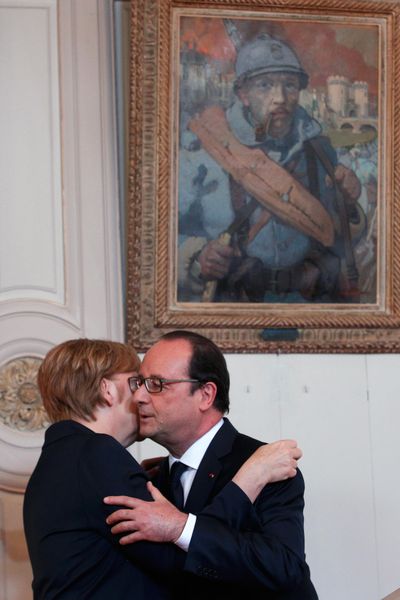German, French leaders mark 100 years since Battle of Verdun

VERDUN, France – In solemn ceremonies Sunday in the forests of eastern France, French President Francois Hollande and German Chancellor Angela Merkel marked 100 years since the Battle of Verdun, determined to show that, despite the bloodbath of World War I, their countries’ improbable friendship is now a source of hope for today’s fractured Europe.
The 10-month battle at Verdun – the longest in World War I – killed 163,000 French and 143,000 German soldiers and wounded hundreds of thousands of others.
Between February and December 1916, an estimated 60 million shells were fired in the battle. One out of four didn’t explode. The front-line villages destroyed in the fighting were never rebuilt. The battlefield zone still holds millions of unexploded shells, making the area so dangerous that housing and farming are still forbidden.
With no survivors left to remember, Sunday’s commemorations were focused on educating youth about the horrors and consequences of the war.
The main ceremony took place at a mass grave where, in 1984, then-French President Francois Mitterrand took then-German Chancellor Helmut Kohl’s hand in a breakthrough moment of friendship and trust by longtime enemy nations.
“This gesture said more than any words,” Merkel stressed in her speech at the Douaumont Ossuary, a memorial to 130,000 unidentified French and German soldiers.
She said the dead of Verdun were “victims of bigotry and nationalism, of blindness and political failure” and the best way to commemorate them is to bear in mind “the lessons that Europe drew from the catastrophes of the 20th century – the ability and willingness to recognize how necessary it is not to seal ourselves off but to be open to each other.”
Merkel added that “the common challenges of the 21st century can only be dealt with together.”
Hollande has called for the “protection of our common house, Europe.” He warned that the “time needed to destroy it would be much shorter than the long time it took to build it.”
Amid rising support for far right parties and divisions among European countries over how to handle refugees, he said Europe’s role is “to fight against terrorism, fanaticism, radicalization” and at the same time to “welcome populations who are fleeing massacres.”